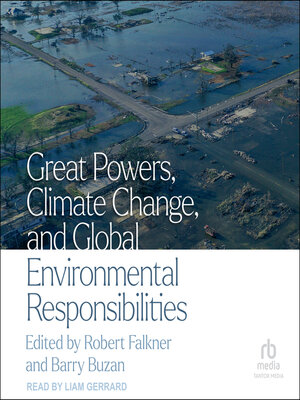Great Powers, Climate Change, and Global Environmental Responsibilities
audiobook (Unabridged)
By Robert Falkner

Sign up to save your library
With an OverDrive account, you can save your favorite libraries for at-a-glance information about availability. Find out more about OverDrive accounts.
Find this title in Libby, the library reading app by OverDrive.



Search for a digital library with this title
Title found at these libraries:
| Library Name | Distance |
|---|---|
| Loading... |
This book is the first of its kind to examine the role of great powers in the international politics of climate change. It develops a novel analytical framework for studying environmental power in international relations, what counts as a great power in the environmental field, and what their special environmental responsibilities are. In doing so, the book connects International Relations (IR) debates on power inequality, great powers and great power management, with global environmental politics (GEP) scholarship.
The book brings together leading scholars in IR and GEP whose contributions focus on major environmental powers (United States, China, European Union) and international institutions and issue areas (UN Security Council, multilateral environmental agreements, coal politics). The contributors examine how individual great powers have responded to the global climate challenge and whether they have accepted a special responsibility for stabilizing the global climate. They place emerging discourses on great power responsibility in the context of wider debates about international environmental leadership and climate change securitization. And they provide new insights into how international power inequality intersects with the global ecological crisis, and what role great powers could and should play in the international fight against global warming.
The book brings together leading scholars in IR and GEP whose contributions focus on major environmental powers (United States, China, European Union) and international institutions and issue areas (UN Security Council, multilateral environmental agreements, coal politics). The contributors examine how individual great powers have responded to the global climate challenge and whether they have accepted a special responsibility for stabilizing the global climate. They place emerging discourses on great power responsibility in the context of wider debates about international environmental leadership and climate change securitization. And they provide new insights into how international power inequality intersects with the global ecological crisis, and what role great powers could and should play in the international fight against global warming.






